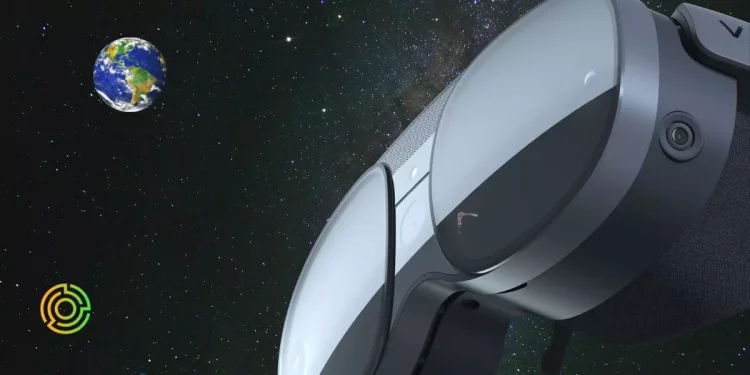HTC plans to unveil a new augmented and virtual reality headset next month that will bolster its presence in the consumer virtual reality market.
The company doesn’t plan to unveil full details until Jan. 5, when CES takes place.
Some previews of the headset
But HTC’s global head of product, Shen Ye, talked about what the company is aiming to achieve with its new design: a small, lightweight all-in-one headset that promises full virtual and augmented reality.
It’s about leveraging all the advances we’ve made not only in design, but also in technology, and turning it into something that makes sense and appeals to consumers,” Ye says.
Buyers will be able to use the headset for gaming, entertainment, exercise and “even some more powerful uses,” such as productivity and work tools, Ye says.
Go small or go home. pic.twitter.com/PUqqKn4V5E
— HTC VIVE (@htcvive) October 6, 2022
It will have a two-hour battery life, be fully autonomous and support six-degrees-of-freedom controllers and hand tracking.
One of the helmet’s main features will be outward-facing cameras that will transmit a color video stream to users’ screens, enabling mixed reality experiences.
This mixed reality option still seems quite experimental; when I asked what buyers might use it for, Ye pointed to HTC’s ongoing relationships with developers and said that the best use cases would likely emerge after launch.
We’re at a stage where the technology is solid and we’ll start to see some really interesting experiences,” Ye promised.
The upcoming headset is the same one that HTC announced in October with few details. We speculated at the time that it was the successor to the Vive Flow, a consumer-oriented headset introduced last year, but HTC has yet to confirm this.
The company describes the device as applying lessons learned with the Flow and the Vive Focus 3, a high-end business headset.
The combination of virtual and augmented reality puts HTC’s headset on par with Meta’s Quest Pro and Apple’s yet-to-be-announced virtual and augmented reality device.
Color transition was one of the strengths of the recently released Meta Quest Pro, and HTC was cautious about making a direct comparison, but Ye offered a couple of possible differences.
For example, HTC’s new headset will have a depth sensor, something Meta had considered but ultimately ruled out. This could allow for more effective tracking and more sophisticated mapping of the wearer’s physical environment.
Ye claims the headset could have better dynamic range than other color-shifting mixed reality options on the market; he described reading text on a laptop or phone screen through HTC’s cameras, something rarely possible on Meta’s Quest Pro.
Other than that, the new headset seems more full-featured than the Flow, but lighter and less bulky than the Vive Focus 3.
“We’ve managed to make our new headset some of the lightest on the market,” Ye says, although we don’t yet know to what extent.
The image shared by HTC doesn’t show the headset’s strap configuration, but Ye’s mention of working out with it suggests it will be more stable than the Flow, which tended to slide around on my face.
We spent a number of time on ergonomics,” Ye says. “The Flow turned into the primary time we used this goggle format, but we found out from the revel in. And while we see that we are able to improve things we continually do.”
“We are at a time while VR headsets have been vastly sponsored by organizations trying to reap personal facts.”
We don’t know if HTC’s device will feature eye-tracking, another feature that Meta and Apple’s latest headsets rely heavily on.
But when asked, Ye noted that the Vive Focus 3 had eye-tracking as an optional modular upgrade, something HTC often offers for its headsets.
He additionally stated HTC is working on state-of-the-art privateness protections with the intention to prevent absolutely everyone from accessing neighborhood or remote digicam statistics on the brand new headsets, such as an encrypted neighborhood partition that shops the records. At a few point, to be able to be included in the utility you asked us for,” he says.
HTC hopes that what they promised in terms of privacy will help differentiate their headset from Meta’s. While we don’t know how much the headset will cost, Ye hints that it will be expensive compared to the $399 Meta Quest 2.
The Vive Flow launched at $499 and the Focus 3 at $1,300, and we wouldn’t be surprised if the new headset falls somewhere between those two prices.
The Quest 2 has more advantages and a lower price. Meta has funded or acquired many good VR experiences, while HTC has historically lagged in this area, although it has offered some unique options such as the Viveport subscription gaming service.
The new headset will offer standalone VR experiences through Viveport and will be able to connect to a PC wirelessly or via cable to play desktop VR games.
Ye says the goal is to offer a “wide range” of experiences when people pick up the headset.
Last year, HTC temporarily declared itself out of the consumer VR game, at least in part because it didn’t want to compete with Meta’s heavily subsidized headset.
What has changed since then?
First, HTC has released two standalone headsets in quick succession, while increasing its own capabilities. We’ve always had a vision of what we believe is a good experience for consumers,” Ye says.
“We recognize how to build the great technology and now we also realize a way to construct superb-small shape aspect gadgets. It’s this knowledge that allows us to feel ready to do something really exciting.”
It’s worth remembering that Apple and Meta are gearing up to fight for the future of consumer VR, so if HTC wants to join the fray, its window of opportunity could close.
Follow us on our social networks and keep up to date with everything that happens in the Metaverse!.
Twitter Linkedin Facebook Telegram Instagram Google News











































